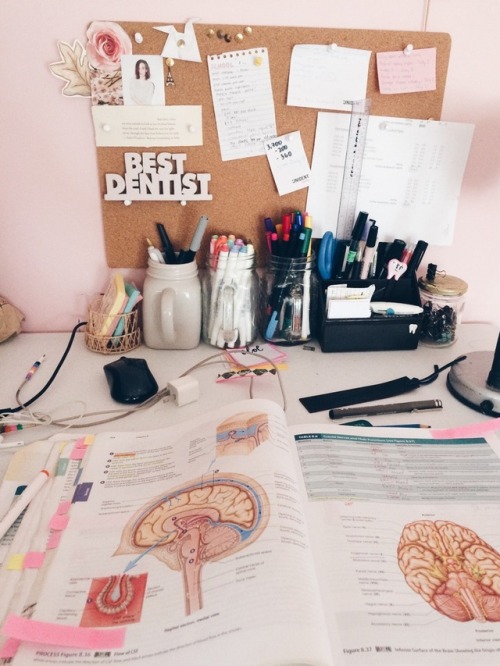#medicinestudent
7-17-17
My current desk situation. Yes it’s messy! I’m reviewing gen ana and physiology, it may come in handy for gen path or pharma.
P.s
3 weeks to go until i start dent 2 proper. I’m getting stressed already
Post link
Starting clinical rotations can be overwhelming. If you’re like me, you may spend the first days stressing about where you should go, what questions are legit to ask and how you should behave. Most of the time you may have no idea of what your superiors are talking about and you just fake a smile and pretend you know exactly what you’re doing. Meanwhile it’s totally normal to feel lost during the first days of your arrival in a new care unit, it shouldn’t last and you should be able to get more comfortable with the team you’re working with and become more autonomous. Here’s how to get the most of your clinical rotations:
- ALWAYS introduce yourself when meeting with a new team : it will always be appreciated and people should be able to reach out to you if they need it
- TAKE NOTES and always keep a little notebook in your pocket! I actually own 3 (yes it may be a bit excessive) : one for patient’s history, one for personal notes and another one for definitions and scores
- Ask for feedback. The resident you’re shadowing may not necessarily think about giving you a feedback, or maybe he won’t pay enough attention to what you’re doing, and that’s why it’s better if you ask specifically for a feedback, especially when completing a task that you’ve been asked to do.
- If there’s a « down » moment when you don’t have anything to do, ask if there’s something you can do for help, even to other members of your team. Don’t hesitate to reach to the nurses or the other medical staff and ask for some teaching! I once spend an entire day with the nurses of my unit so I could learn how to properly draw blood.
- If there’s really nothing to do, use this spare time to study a specific subject, and ask your resident if you can present it to him : not only it forces you to study a subject, but you’ll also be able to actively recall it better
- Before seeing any patient alone, make sure you went through his medical history so you already know if there’s a specific topic you have to investigate more : be prepared for questions from your assigned residents/physicians!
- MAKE THE CALLS. I know, I know, making phone calls is SUPER SCARY (especially when you have to call chiefs and professors). However, I like to say that it’s like running : the more difficult it is, the more you should do it. Prepare what you have to say so you don’t loose yourself during the call, and force yourself to make the phone calls as often as possible. You’ll gain more and more confidence and you won’t be so scared anymore.
- NEVER be late.
- If you feel there’s something wrong (with you of with a situation) : talk to your assigned resident/physician. They know how overwhelming it can get, so don’t hesitate to reach out for help
- Bring snacks. And a big water bottle. Avoid drinking too much coffee.
- Being a medical student has many good sides : you can get a first hand-on experience with patients without huge responsibilities, it is the BEST time to make mistakes and ask « silly » questions ! If you don’t do this during this time, you won’t be able to do it later.
- Most of the time, you’ll feel like you know nothing, and you’ll forget about things you learned the day before. It’s normal. Don’t be too hard on yourself.
- Be patient. And LISTEN.
- ENJOY YOUR TIME ! Be curious about everything, make new friends, talk with your patients, see as many things as you can, because this is the only time where you can get all these possibilities!!

Happy new year guys! Currently studying for my exams which are in 3 days!
Ig : anatomyandcappuccini


